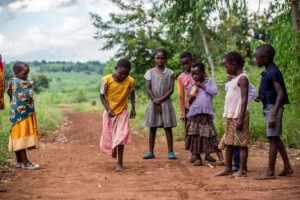Day of the African Child: Setting Up for Success
The Day of the African Child (DAC) is celebrated every year on 16 June, and commemorates the sacrifices of young black South African students in 1976, who rose up in protest against an unjust apartheid and education system.
Commemorating the Day of the African Child
The DAC was first observed in 1991, and has since evolved into a special day to reflect on the challenges faced by Africa’s youth, and to find sustainable solutions.
At mothers2mothers (m2m)—an African not-for-profit organisation that employs women living with HIV as frontline health workers known as “Mentor Mothers”—we understand some of these challenges all too well:
-
- In sub-Saharan Africa, 130,000 new infections were reported among children in 2020, a slight rise on the 126,000 new infections reported in 2019.
- In 2019, just 58% of children living with HIV were on treatment in Eastern and Southern Africa, compared to 73% of adults.
- Missing developmental milestones can lead children and adults to have health, learning and productivity issues.
- Conception to age three is now recognised globally as the most critical phase in a child’s development

Play Group in Mulanje, Malawi 10 April 2019 | Photographer: Karin Schermbrucker
Our Mentor Mothers are working across health facilities and in communities, to ensure that every child thrives, not just survives. We have integrated services in our Early Childhood Development (ECD) programme to improve the health and development of infants and children (aged 0-9), and to ensure that they are protected.
We are also tackling unacceptably low rates of testing and treatment among HIV-exposed children. Mentor Mothers conduct home visits and identify all at risk children at health facilities, and provide them and their families with support to undergo HIV testing. In the event of a positive diagnosis, the children are enrolled into the m2m programme and linked to health services where they are started on treatment, and retained in care.
Mentor Mothers like Jane Njoki Peris, who works at the Mathare North Health Centre in Nairobi Kenya, also help to promote an environment of nurturing care for the youngest children. She educates parents and caregivers on early learning stimulation, responsive and playful parenting, health, nutrition, safety, and protection.

Jane Peris Njoki from the Mathare North Health Centre in Nairobi, Kenya
“We have established an ECD corner in the health facility. It’s a place stocked with toys and books for children. When a mother brings their child in for immunisations, we take them and the child to the ECD corner. There, we encourage the mother to play with her child—we don’t tell them how to do this, we show them.”
“We also teach mothers to make toys like balls and dolls of cloth and plastic. We encourage the mothers to read to their children so they can develop their language skills,” adds Jane.
Through these interventions, 94% of our early childhood development clients aged 0-3 in 2019 reached their developmental milestones at one year of age. m2m also achieved virtual elimination mother-to-child transmission of HIV for six years in a row, well below the UN’s 5% benchmark.
On this DAC, we would like to recommit our efforts to support Africa’s children. We will continue grow and innovate our programme and tailor our child-friendly services to create a truly healthy, HIV-free generation.






















